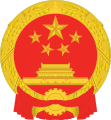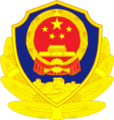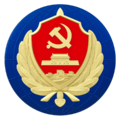State Council of the People's Republic of China facts for kids
| 中华人民共和国国务院 Zhōnghuá Rénmín Gònghéguó Guówùyuàn |
|
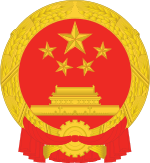
Emblem of the People's Republic of China
|
|
| Agency overview | |
|---|---|
| Formed | 27 September 1954 |
| Preceding agencies |
|
| Type | Executive branch of the central government Executive body of the National People's Congress Highest organ of State administration |
| Jurisdiction | Government of the People's Republic of China |
| Headquarters | State Council Office Area, Zhongnanhai, Beijing |
| Annual budget | CN¥37.2 trillion (2019) |
| Agency executives |
|
| Child agencies |
|
| State Council of the People's Republic of China | |||||||||
|---|---|---|---|---|---|---|---|---|---|
| Simplified Chinese | 中华人民共和国国务院 | ||||||||
| Traditional Chinese | 中華人民共和國國務院 | ||||||||
| Literal meaning | "Chinese People('s) Republic State Affair(s) Court" | ||||||||
|
|||||||||
| State Council (commonly used abbreviation) |
|||||||||
| Simplified Chinese | 国务院 | ||||||||
| Traditional Chinese | 國務院 | ||||||||
| Literal meaning | "The Court of State Affairs" | ||||||||
|
|||||||||
| Central People's Government (Constitutional synonym) |
|||||||||
| Chinese | 中央人民政府 | ||||||||
| Literal meaning | Central People('s) Government | ||||||||
|
|||||||||
The State Council is like the main government "cabinet" of the People's Republic of China. It is also known as the Central People's Government. This important group is in charge of running the country every day.
The State Council is led by the Premier. It includes the leaders of all the different government departments, called ministries. Right now, there are 35 members in the State Council. These include the Premier, four Vice Premiers, five State Councillors, and 26 heads of government departments. The State Council also works closely with the top leaders of the Chinese Communist Party (CCP).
Contents
How the State Council Works
The Chinese constitution says the State Council is the main executive body of the National People's Congress (NPC). This means it carries out the decisions made by the NPC. It is also the highest government body in China.
Main Jobs of the State Council
The State Council has several key responsibilities:
- It creates rules and plans for how the government should work.
- It makes decisions and gives orders, then makes sure they are followed.
- It prepares new laws to be approved by the NPC.
- It creates the country's economic plan and budget.
The State Council works under the guidance of the Chinese Communist Party (CCP). The most important decisions are made by the CCP's Politburo.
Leaders of the State Council
The Premier is the head of the State Council. The Premier is chosen by the President and approved by the NPC. However, in reality, the Premier is selected by the top leaders of the CCP.
The Premier gets help from several Vice Premiers and State Councillors. There is usually one main Vice Premier and three others. There is also a Secretary-General who helps with daily tasks. These leaders together form the Executive Meeting of the State Council.
Each Vice Premier is responsible for certain areas of government work. State Councillors also take on different roles and work with various government bodies. This helps the State Council manage many different parts of the government. The Secretary-General leads the General Office, which handles the day-to-day operations.
Meetings and Departments
The full State Council has a meeting called the Plenary Session about twice a year. Between these larger meetings, the Executive Meeting of the State Council meets more often, usually two or three times a month. The Premier can call these meetings whenever needed.
The State Council includes 26 main government departments, called ministries. Each ministry is in charge of one specific area, like foreign affairs or education. Some departments are called "commissions" and they are even more important than ministries. They set policies and coordinate activities across different government bodies. There are also other offices, bureaus, and administrations that work under the State Council.
The State Council oversees the governments in all of China's provinces.
State Council and the Military
The State Council controls the Ministry of National Defense. However, it does not control the People's Liberation Army (PLA), which is China's military. The PLA is controlled by a separate body called the Central Military Commission (CMC).
Who is in the State Council?
Executive Meeting Members
These are the top members who lead the State Council's daily work.
| # | Portrait | Name | Government office(s) | Party | Party memberships | |
|---|---|---|---|---|---|---|
| 1 | 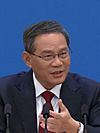 |
Li Qiang 李强 |
Premier | CCP | Politburo Standing Committee Secretary, State Council Party Group |
|
| 2 | 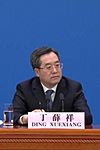 |
Ding Xuexiang 丁薛祥 |
Vice Premier
(first-ranked) |
CCP | Politburo Standing Committee Deputy Secretary, State Council Party Group |
|
| 3 | 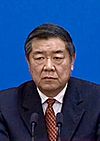 |
He Lifeng 何立峰 |
Vice Premier | CCP | Politburo State Council Party Group |
|
| 4 | 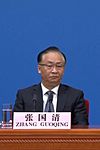 |
Zhang Guoqing 张国清 |
Vice Premier | CCP | Politburo State Council Party Group |
|
| 5 | 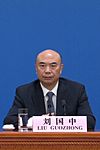 |
Liu Guozhong 刘国中 |
Vice Premier | CCP | Politburo State Council Party Group |
|
| 6 | 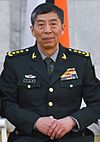 |
General Li Shangfu 李尚福 |
State Councillor Minister of National Defense |
CCP | Central Military Commission State Council Party Group |
|
| 7 | 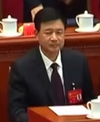 |
Police Commissioner-General Wang Xiaohong 王小洪 |
State Councillor Minister of Public Security |
CCP | Secretariat Deputy Secretary, Central Political and Legal Affairs Commission State Council Party Group |
|
| 8 | Wu Zhenglong 吴政隆 |
State Councillor Secretary-General of the State Council |
CCP | State Council Party Group Secretary, State Council Organs Party Group |
||
| 9 | Shen Yiqin 谌贻琴 |
State Councillor | CCP | State Council Party Group | ||
| 10 | 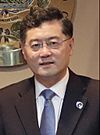 |
Qin Gang 秦刚 |
State Councillor Minister of Foreign Affairs (until 25 July 2023) |
CCP | State Council Party Group | |
Plenary Meeting Members
The Plenary Meeting of the State Council is led by the Premier. It includes the Vice Premiers, State Councillors, and the heads of all the Ministries and Commissions. The Governor of the People's Bank and the Auditor-General also attend. Other people can be invited to join if needed.
Government Departments
The State Council has many different departments that help run the country. Here are some of the main ones:
Cabinet-Level Departments
These are the most important departments, like the main parts of a cabinet.
| # | Logo | Name of department | Year established | Incumbent chief | Party | Reports to | |
|---|---|---|---|---|---|---|---|
| 1 |  |
Ministry of Foreign Affairs 外交部 |
1949 (CPG) 1954 (PRC) |
Wang Yi 王毅 Minister of Foreign Affairs |
CCP | General Secretary Xi Jinping ∟ Director of the Office of the Central Foreign Affairs Commission Wang Yi (himself) |
|
| 2 |  |
Ministry of National Defense 国防部 |
1954 | General Li Shangfu 李尚福 (Member of the Central Military Commission) State Councillor Minister of National Defense |
CCP | General Secretary Xi Jinping (Chairman of the Central Military Commission) | |
| 3 |  |
National Development and Reform Commission 国家发展和改革委员会 |
2003 | Zheng Shanjie 郑栅洁 Chairman of the National Development and Reform Commission |
CCP | Vice Premier Ding Xuexiang | |
| 4 |  |
Ministry of Education 教育部 |
1949 (CPG) 1954 (PRC) |
Huai Jinpeng 怀进鹏 Minister of Education |
CCP | ||
| 5 |  |
Ministry of Science and Technology 科学技术部 |
1998 | Wang Zhigang 王志刚 Minister of Science and Technology |
CCP | ||
| 6 |  |
Ministry of Industry and Information Technology 工业和信息化部 |
2008 | Jin Zhuanglong 金壮龙 Minister of Industry and Information Technology |
CCP | Vice Premier Zhang Guoqing | |
| 7 |  |
National Ethnic Affairs Commission 国家民族事务委员会 |
1949 (CPG) 1954 (PRC) |
Chen Xiaojiang 陈小江 Minister in charge of the National Ethnic Affairs Commission |
CCP | Shi Taifeng (Head of the CCP Central Committee United Front Work Department) | |
| 8 |  |
Ministry of Public Security 公安部 |
1949 (CPG) 1954 (PRC) |
Police Commissioner-General Wang Xiaohong 王小洪 State Councillor |
CCP | Chen Wenqing (Secretary of the CCP Central Political and Legal Affairs Commission) | |
| 9 |  |
Ministry of State Security 国家安全部 |
1983 | Chen Yixin 陈一新 Minister of State Security |
CCP | ||
| 10 |  |
Ministry of Civil Affairs 民政部 |
1978 | Tang Dengjie 唐登杰 Minister of Civil Affairs |
CCP | State Councillor Shen Yiqin | |
| 11 | Ministry of Justice 司法部 |
1949 (CPG) 1954 (PRC) 1979 (re-established) |
He Rong 贺荣 Minister of Justice |
CCP | Chen Wenqing (Secretary of the CCP Central Political and Legal Affairs Commission) | ||
| 12 |  |
Ministry of Finance 财政部 |
1949 (CPG) 1954 (PRC) |
Liu Kun 刘昆 Minister of Finance |
CCP | Vice Premier Ding Xuexiang | |
| 13 |  |
Ministry of Human Resources and Social Security 人力资源和社会保障部 |
2008 | Wang Xiaoping 王晓萍 Ministry of Human Resources and Social Security |
CCP | State Councillor Shen Yiqin | |
| 14 |  |
Ministry of Natural Resources 自然资源部 |
2018 | Wang Guanghua 王广华 Minister of Natural Resources |
CCP | Vice Premier Ding Xuexiang | |
| 15 |  |
Ministry of Ecology and Environment 生态环境部 |
2018 | Huang Runqiu 黄润秋 Minister of Ecology and Environment |
JS | ||
| 16 |  |
Ministry of Housing and Urban-Rural Development 住房和城乡建设部 |
2008 | Ni Hong 倪虹 Minister of Housing and Urban-Rural Development |
CCP | Vice Premier He Lifeng | |
| 17 |  |
Ministry of Transport 交通运输部 |
2008 | Li Xiaopeng 李小鹏 Minister of Transport |
CCP | ||
| 18 |  |
Ministry of Water Resources 水利部 |
1949 (CPG) 1954 (PRC) |
Li Guoying 李国英 Minister of Water Resources |
CCP | Vice Premier Liu Guozhong | |
| 19 |  |
Ministry of Agriculture and Rural Affairs 农业农村部 |
2018 | Tang Renjian 唐仁健 Minister of Agriculture and Rural Affairs |
CCP | ||
| 20 |  |
Ministry of Commerce 商务部 |
2003 | Wang Wentao 王文涛 Minister of Commerce |
CCP | Vice Premier He Lifeng | |
| 21 |  |
Ministry of Culture and Tourism 文化和旅游部 |
2018 | Hu Heping 胡和平 Minister of Culture and Tourism |
CCP | Li Shulei (Head of the CCP Central Committee Propaganda Department) | |
| 22 |  |
National Health Commission 国家卫生健康委员会 |
2018 | Ma Xiaowei 马晓伟 Minister in charge of the National Health Commission |
CCP | Vice Premier Liu Guozhong | |
| 23 |  |
Ministry of Veterans Affairs 退役军人事务部 |
2018 | Pei Jinjia 裴金佳 Minister of Veterans Affairs |
CCP | State Councillor Shen Yiqin | |
| 24 |  |
Ministry of Emergency Management 应急管理部 |
2018 | Wang Xiangxi 王祥喜 Ministry of Emergency Management |
CCP | Vice Premier Zhang Guoqing | |
| 25 |  |
People's Bank of China 中国人民银行 |
1948 | Yi Gang 易纲 Governor of the People's Bank of China |
CCP | Vice Premier Ding Xuexiang | |
| 26 |  |
National Audit Office 审计署 |
1983 | Hou Kai 侯凯 Auditor-General of the National Audit Office |
CCP | Premier Li Qiang ∟ Vice Premier Ding Xuexiang |
|
Other Important Organizations
The State Council also oversees many other organizations that help manage different parts of the country. These include:
- State-owned Assets Supervision and Administration Commission of the State Council (SASAC): This group manages companies owned by the government.
- General Administration of Customs: This group handles goods coming into and leaving China.
- State Administration of Taxation: This group is in charge of collecting taxes.
- National Radio and Television Administration: This group oversees radio and television.
- General Administration of Sport: This group manages sports in China.
- National Bureau of Statistics: This group collects and shares important data about the country.
- China Meteorological Administration: This group is in charge of weather forecasting.
- Civil Aviation Administration of China (CAAC): This group manages air travel in China.
- National Cultural Heritage Administration: This group protects China's historical and cultural sites.
- National Health Commission: This group manages public health.
- People's Bank of China: This is China's central bank.
Images for kids
See Also
 In Spanish: Consejo de Estado de la República Popular China para niños
In Spanish: Consejo de Estado de la República Popular China para niños
- Department of State Affairs in the Three Departments and Six Ministries system
- Ming dynasty: Central Secretariat → Grand Secretariat
- Qing dynasty: Grand Secretariat → Grand Council → Cabinet
- Republic of China: State Council (1912–28) → Executive Yuan (1928–present)
- People's Republic of China: Government Administration Council of the Central People's Government (1949–54); Ministries of the PRC
 | Anna J. Cooper |
 | Mary McLeod Bethune |
 | Lillie Mae Bradford |


